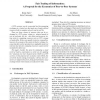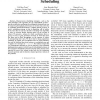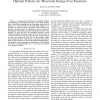SIGECOM
2003
ACM
14 years 4 months ago
2003
ACM
A market-based scheduling mechanism allocates resources indexed by time to alternative uses based on the bids of participating agents. Agents are typically interested in multiple ...
INFOCOM
2005
IEEE
14 years 5 months ago
2005
IEEE
— We consider the problem of allocating resources (time slots, frequency, power, etc.) at a base station to many competing flows, where each flow is intended for a different re...
IEEEARES
2006
IEEE
14 years 5 months ago
2006
IEEE
A P2P currency can be a powerful tool for promoting exchanges in a trusted way that make use of under-utilized resources both in computer networks and in real life. There are thre...
ICC
2007
IEEE
14 years 5 months ago
2007
IEEE
— This paper presents a transmission scheduling scheme in sensor networks. Each node is assigned a list of time slots to use for unicast and broadcast communication. The algorith...
ICC
2007
IEEE
14 years 5 months ago
2007
IEEE
Abstract - We propose a new space-time code (STC) structure that can achieve generalized optimal diversity (GOD) with a reduced design complexity, and also provide an increased cod...
NDSS
2008
IEEE
14 years 5 months ago
2008
IEEE
Third Generation (3G) cellular networks utilize timevarying and location-dependent channel conditions to provide broadband services. They employ opportunistic scheduling to effic...
GLOBECOM
2008
IEEE
14 years 5 months ago
2008
IEEE
Abstract— The coexistence and resource sharing between a primary network utilizing cognitive relays and a secondary network are investigated. Two multiple access protocols are pr...
INFOCOM
2009
IEEE
14 years 6 months ago
2009
IEEE
—Channel-aware scheduling strategies - such as the CDF Scheduler (CS) algorithm for the CDMA/HDR systems provide an effective mechanism for utilizing the channel data rate for im...
ICC
2009
IEEE
14 years 6 months ago
2009
IEEE
— A point-to-point discrete-time scheduling problem of transmitting B information bits within T hard delay deadline slots is considered assuming that the underlying energy-bit co...






